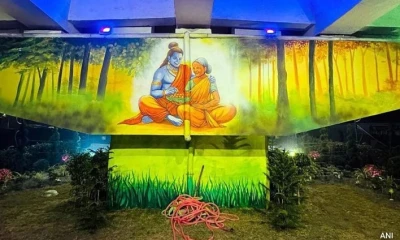PTI | Edited By NE Watch Desk
Separated by geographical boundaries but
united by a profound spiritual bond, the towns of Ayodhya in Bharat and
Ayutthaya in Thailand share more than just a name. As Ayodhya prepares for the
consecration of its grand Ram temple in three days, Ayutthaya, situated 3,500
km away, is equally immersed in religious fervour, echoing the sentiments of
the devotees in the homeland of Lord Ram.
The Ayodhya temple trust has received
symbolic offerings from Ayutthaya, named after its Indian counterpart. Soil
from the Thai town and water from three significant rivers, Chao Phraya, Lop
Buri, and Pa Sak, have been sent to Bharat for use in the consecration ceremony
of the Ram temple.
Ayutthaya, nestled along the banks of
the Chao Phraya River, stands as an ancient city, recognized as a UNESCO World
Heritage site for its rich cultural history. Hindu temples in Ayutthaya and
other Thai cities are gearing up for the live telecast of the ‘pran pratishtha’
ceremony on January 22, with large screens set up to facilitate devotees’
participation.
During the ceremony, earthen lamps, or ‘diyas,’
will be lit at temples, and an enactment of the epic Ramayana will take place,
accompanied by the singing of Ram bhajans. The Vishwa Hindu Parishad or VHP
member from Bangkok highlighted the arrangements made for devotees to witness
the consecration ceremony live, emphasizing the cultural and spiritual
connection shared between the two towns.
Champat Rai, the general secretary of
Shri Ram Janmabhoomi Teerth Kshetra Trust, expressed that Ayutthaya is regarded
as the Ayodhya of Thailand, underscoring the symbolic significance of receiving
soil and water from there for the consecration ceremony.
Swami Vigyanand, founder and global
chairman of the World Hindu Foundation or WHF, emphasized the historical
connection between Ayutthaya and Ayodhya, tracing it back to King Ramathibodi’s
naming of the Thai city after Ayodhya. This connection deepened over time, with
subsequent kings adopting the name Rama, solidifying the cultural link to Lord
Ram.
Ayutthaya, officially known as the
Historic City of Phra Nakhon Si Ayutthaya, was founded in 1350 and served as
the second capital of the Siamese Kingdom. While it faced destruction in 1767
by the Burmese army, it remains an archaeological site, preserving remnants of
its past splendor.
Eminent Sanskrit scholar Satya Vrat
Shastri noted the adaptation of the Ramayana into the Thai version, Ramakien,
during the Ayutthaya Kingdom, showcasing the enduring impact of Lord Rama’s
life on Thai culture.
The spiritual connection between Ayodhya
and Ayutthaya extends beyond religious rituals, reflecting in shared festivals
and cultural practices. As India celebrates Kartik Poornima and Dev Deepawali,
Thailand observes Loy Krathong, known as the festival of lights.
With both countries embracing their
cultural heritage and religious roots, the forthcoming consecration ceremony in
Ayodhya stands as a testament to the enduring spiritual bond that transcends
borders and unites the hearts of devotees in India and Thailand.

















